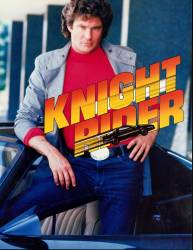Knight Rider [Pilot; a.k.a. Knight of the Phoenix] (2) - S1-E2
Continuity mistake: During Comtron's Demolition Derby, Michael engages auto control. Michael controls the wheel during the ski mode stunt. When the car drops back on four wheels, Michael is driving with a regular steering wheel instead of KITT's steering wheel.
Knight Rider [Pilot; a.k.a. Knight of the Phoenix] (2) - S1-E2
Continuity mistake: As Michael realises how he will be stopped on the way to the airport, he pulls over. KITT's front lower bumper does not have its spotlights, it is just a plain bumper.
Knight Rider [Pilot; a.k.a. Knight of the Phoenix] (2) - S1-E2
Continuity mistake: After Michael gets shot and gets in his car to race to the airport, he calls Devon on the intercom. Before he gets into the car, he flinches and grasps his left side shoulder area where he was originally shot. When he talks to Devon, he's grasping his right shoulder. After he finishes talking and continuing the drive, he grasps the left one again.
Knight Rider [Pilot; a.k.a. Knight of the Phoenix] (2) - S1-E2
Continuity mistake: The crooks steal KITT. When KITT announces himself, the crooks slam on the brakes. When the car comes to a halt, the back seat cushion is thrown forward. When the crooks take off, the back seat looks as if it hasn't ever moved forward.






Answer: I would say that unless there's visual evidence it was another K.I.T.T. car, as in you could see the bar scanner or cut steering wheel, people on here would correct the mistake by saying more than one 1982 Pontiac Firebird Trans-Am was sold and there's no reason it's meant to be a random car.
Bishop73